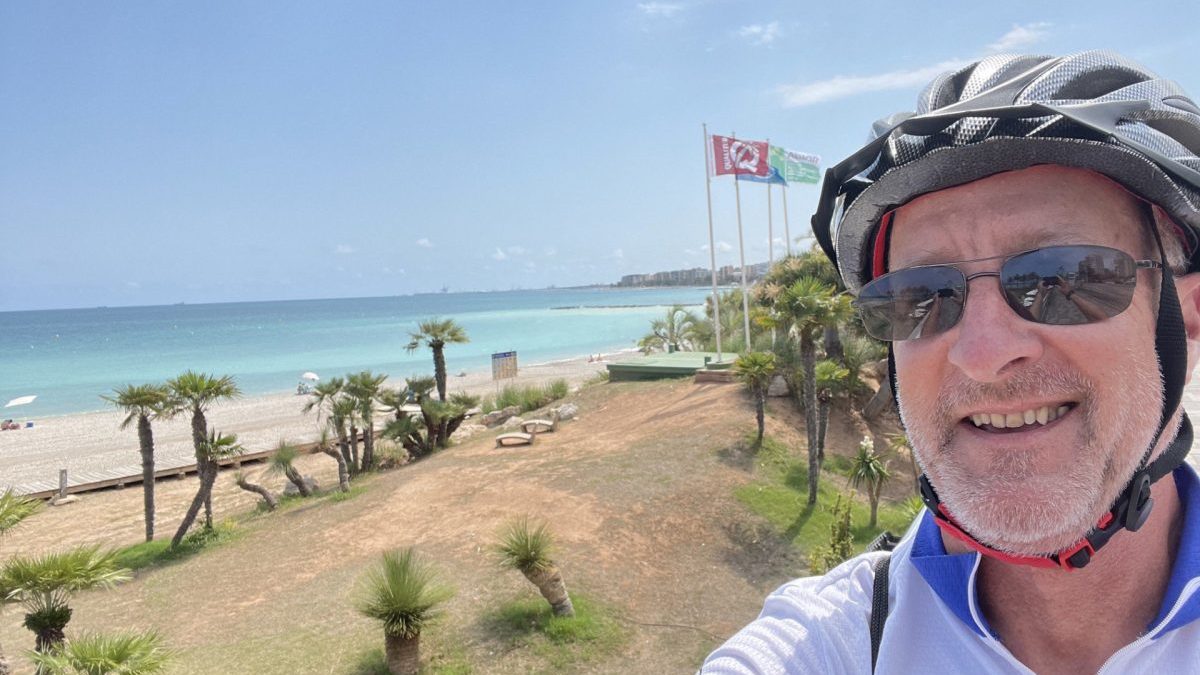The digital nomad life might be commonly associated with young people. But one British expat in his sixties did not let that put him off.
Mike Bailey moved to Spain two years ago after securing a digital nomad visa, a process he says was quick and easy, and allowed him to move to the country for as long as he pleases.
Mr Bailey, from London, now lives with his partner and two dogs in the seaside town of Castellón, known for its citrus groves, near Valencia on Spain’s east coast.
He works as a freelance copywriter for international clients – the same work he was doing back in the UK.
He says getting a digital nomad visa was a surprisingly smooth and quick process – in fact you should get a decision within 20 days – though it does involve significant paperwork.
 Mr Bailey first visited Spain on holiday in the late 80s, and worked in Madrid from 1999 until 2013 (Photo: Mike Bailey)
Mr Bailey first visited Spain on holiday in the late 80s, and worked in Madrid from 1999 until 2013 (Photo: Mike Bailey)
“When the digital nomad visa was introduced in late 2022, it opened up opportunities for non-EU citizens to work remotely in Spain for non-Spanish companies as contractors or freelancers. This was ideal for me”, Mr Bailey told The i Paper.
“I began gathering the paperwork for the application in May 2023, applied in August, and was granted my visa in early September. The process took just under four months from start to finish.”
There is a fair amount of paperwork to gather and, in some cases, translate and authenticate through the apostille process.
“But if you organise yourself well and use a recognised immigration expert – I cannot stress that enough – you will give yourself a good chance of success”, said Mr Bailey.
 He now plans to retire in Spain (Photo: Mike Bailey)
He now plans to retire in Spain (Photo: Mike Bailey)
Applicants must be at least 18 years old to apply but there is no upper age limit. Other requirements include a minimum income of €2,760 per month (€33,120, or (£28,696 per year), primarily from companies registered outside Spain; proof of at least three consecutive months’ contracts with a foreign company or companies if you are self-employed; and three years’ experience in your field.
And he plans to stay. The visa is valid for one year if you apply from outside Spain, he said, or longer if you are already living in Spain. “It is renewable every two years after that, up to a maximum of five years. After that, you become eligible to apply for permanent residency,” he added.
When Mr Bailey retires, most likely within the next five years, he will receive a combination of a Spanish and UK state pension.
Mr Bailey said he fell in love with Spain when he first visited on holiday in the late 80s. He then worked in Madrid from 1999 until 2013, when he was forced to return to the UK due to a lack of work in Spain.
But Mr Bailey vowed to return as soon as an opportunity arose – which happened in 2023 after the digital nomad visa was introduced.
The couple chose Castellòn, where they rent a three-bedroom house, for its unspoiled scenery and its location on the Mediterranean coast, “where the climate is not as extreme as in other parts of Spain”.
The cost of living is also better than the UK, he said: “I estimate that, on average, it’s 20-25 per cent cheaper to live in Spain compared to the UK.” And with the minimum earning requirement that comes with the digital nomad visa, you can live a very comfortable life, he added.
